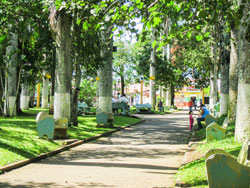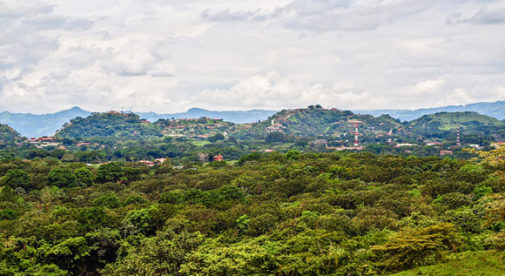Bless her heart, but my wife’s friend “Linda” (name changed to protect the embarrassed) has a knack for often saying the “wrong” thing when speaking Spanish. And during her visit to our home in Costa Rica years ago she outdid herself. It’s a story we still laugh about when we’re all together. And I tell it to you so you see some of the struggles and embarrassment you might feel when practicing Spanish. But, more importantly, you’ll understand why it’s not such a big deal and learning Spanish will be a rewarding experience and connect you more closely to your new home.
At breakfast Linda tried to tell the waiter she needed more coffee because she was tired (Estoy cansada) but repeated Estoy casada (“I’m married”) several times, as if fending off his advances.
He knew what was going on and smiled. Then gave her a mini-lesson in the vital difference that missing “n” made.
But I will give credit to Linda for knowing the number one rule of speaking Spanish in Costa Rica. You can get by just fine without hardly any knowledge at all. You can do your banking, pay your bills, go shopping, buy a car, get medical care (so many doctors trained in the U.S. and Canada, almost all are fluent)…everything, without speaking a word.
But the thing is…a little goes a long way. And it’s definitely worth learning what you can.
Even if it’s just a simple Buenos Dias, Como esta? “Good morning, how are you?” and then you launch into English, Costa Ricans really do appreciate the effort. They’ll immediately break into a big smile.
The bottom line is that the proper greeting is a big deal in Costa Rica and other Latin American countries. It’s a sign of respect, plain and simple, for the people of your new home. And if you decide to go further and end up stumbling over your words, don’t fret. As with Linda, nobody will scoff or laugh. They’ll be patient and kind, eager to let you practice.

In tourist areas, you’ll have more English speakers, of course, especially at hotels, shops, tour companies, and bars and restaurants. In some very expat-heavy regions, especially on the Gold Coast on the northern Pacific, it’s as if English is the first language.
Even in off the beaten path areas, many, especially the younger generation, speak pretty good English. It’s thanks to classes at school, private lessons, and satellite TV. To be honest, the abundance of English speakers can make it hard sometimes to practice your Spanish. But be persistent and speak it, even if you get replies in English.
If you’re interested in learning Spanish, it’s a good idea to get started as soon as possible before your move. There are plenty of online language courses, smartphone apps, and even classes in your local community (low cost or free) available. And you can continue your education when you get to Costa Rica by going to one of the many language schools found all over the country or hiring a private tutor. Over time, you’ll get better and better. Maybe you won’t be fluent, but you will be able to make yourself understood and understand others.
Canadian Ruth Thumm has lived off and on in Atenas, in the Central Valley, for nearly 20 years. She gets by knowing a few phrases to chat with the neighbors and some numbers to buy produce at the farmers’ market.
I’ve met plenty of expats in the same boat. Maybe they’ve struggled through Spanish courses or just don’t feel they can learn a new language. But it’s not an obstacle to truly enjoying life in Costa Rica.
And Linda? She made it through a two-week public bus trip throughout the country and into Nicaragua, including some very remote areas, just fine.
In a strange twist, it was on that trip that she met her future husband (that conversation with the waiter turned out to be funnily prescient) in a small village she was visiting. He didn’t speak any English. And she at that time was still learning. Somehow they communicated (the language of love, perhaps?). They married and her Spanish has improved immensely…although she still makes the occasional faux pas.
Get Your Free Costa Rica Report Here
Learn more about Costa Rica and other countries in our daily postcard e-letter. Simply enter your email address below and we’ll send you a FREE REPORT – Why Are Americans Still Flocking to Costa Rica.
This special guide covers real estate, retirement and more in Costa Rica and is yours free when you sign up for our IL postcards below.

